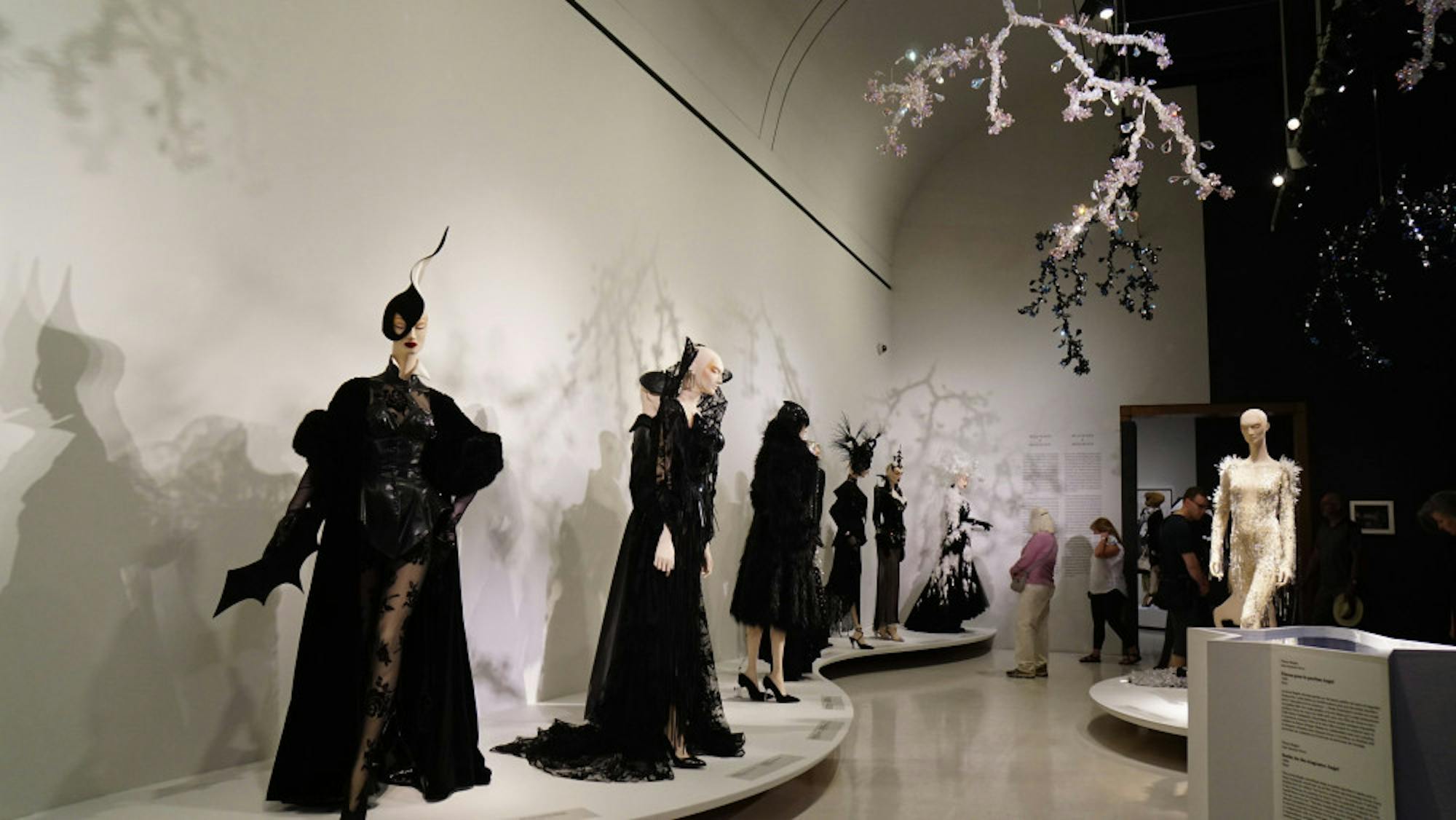Mugler’sspring 2021 ready-to-wear collection stays true to the label’s form while also bringing just what fashion needs to shake its pandemic slump. The full collection was designed by Casey Cadwallader and dropped through a runway video just last week. Expanding upon part one of the collection released in October, it surely did not disappoint. You can see the video and a slideshow of all the looks here.
The first point of success was, of course, the runway cast. The show featuresHunter Schafer of "Euphoria" (2019–), Dominique Jackson of "Pose" (2018–), internet personalityPatia Borja and the striking artistKembra Pfahler. Several high-profile models such as Bella Hadid, Omahyra Mota, Soo Joo Park and Alek Wektook to the runway as well. Mugler has recently become synonymous with celebrity style, with looks appearing on Lady Gaga, Cardi B, Beyoncé, Kim Kardashian, Rihanna and more.
The star-studded runway of Mugler’s latest show thus comes as no surprise, but it also is notable for its relative diversity in both body type and race.Mugler specifically released the video on March 31 as well, which is International Transgender Day of Visibility. Schafer and Jackson, who are both transgender women, wore many of the standout looks.
Designs were thus importantly framed by the bodies who wore them, but the centerpiece was undoubtedly the clothing itself. It followed the raunchy style for which Mugler is known while adding new twists, for example with the skin-tight designs of Looks 2 and 14. These bodycon gloves miraculously transform black and nude tights-like material and scandalous cut-out patterns to perfectly encase the body and accentuate a person’s unique curves. Rather than favoring one body type over another, they embrace curvier and thinner models alike. Even though they align with the in-your-face, nearly-naked vibe of Mugler’siconic styles from the '80s and '90s, their sleeker adaptation has really appealed to newer celebrities and put the brand back on the map.
Mugler has shown designs like these before on celebrities, but Cadwallader pushes their concept further in this collection. For example, he plays with brighter colors of the same material and style in Looks 8 and 19 through 22. He wonderfully combines the cut-out designs and gauzy fabric in Looks 25 and 27, balancing tight wrappings around unusual cross sections of the body with the simultaneous ability for flowing, flexible movement. He even manages to adapt the idea of a power suit, which is normally highly structured, to a more fluid but no less striking form in Looks 14 and 23.
Models literally leap, backflip and dance across the stage throughout the video while wearing these clothes, directly proving their remarkable comfort and body coverage through what Voguedescribes as a creative combination of sportswear and lingerie. This body positivity is valuable in and of itself, but especially now as the weather warms and restrictions for seeing others begin to lift. Mugler might be just what we need to move away from the pandemic sweatpants and go back to celebrating our bodies in more formal yet revealing clothing.
In fact, the almost entirely translucent, dazzling mesh suits of Looks 16 and 17 clearly stand out as the show-stopper designs. They reflect the brand’s traditionally futuristic themes by making the models look almost unreal. At the same time, the shimmering material blends into the skin so well that it seems to just enhance a natural glow. In the video, Schafer appears wearing one of these dresses while drenched in water. Then, reversed footage of the water being poured onto her reveals the shine of the dress to be nearly identical when she is dry. Effects like these through the video play deftly to the advantages of a virtual format. Despite the limitations of a remote fashion show, Mugler gets it just right.
Beyond just being visually engaging, the water effect of this specific moment also shows the quality of the clothing. It proves to viewers that the fabric truly makes one look as though they are bathed in magically shining morning dew and (literally) provides a refreshing splash as we head into spring and summer. The material appears most impressively as a glamorous second skin covering otherwise nude models in the aforementioned looks, but it also gives a lovely effect in the top/glove combo of Looks 4 and 5. The models wearing the material help to show that it is versatile for different types of garments and different skin tones.
However, not all of the looks hit the mark. Although the brand's original designer, Thierry Mugler, favored extreme, over-the-top looks,he left the fashion industry in 2002. Cadwallader is focused on developing a more practical side to the brand as the current creative director, and this collection exposes some of the growing pains of that transition.
For instance, the silky wrapped blouses of Looks 12 and 29 are no doubt gorgeous, but they seem like something that could just as easily be found at a chain store like Urban Outfitters or Aritzia. Meanwhile, the denim suits with thong-like color blocking in Looks 32 and 35 try to adapt Mugler’s sexiness to a more casual material but end up looking bulky and uncomfortable. Even the boxy shirts and blazers meant to reference a bright green suit designed for David Bowie in the ‘90s clash weirdly when they’re combined with cut-outs revealing tighter-fitting pieces underneath. By attempting to tone down Mugler’s classic garishness without eliminating it completely, these styles end up looking either generally cute without any originality, or slightly weird but not enough to achieve shock value appeal.
Ultimately, some of Mugler’s spring styles combine the label’s past with a modern take better than others, but the collection as a whole embraces gender, skin color and the body in a way that fashion needs at this moment. Mugler is more than its history, and evolving its classic flare for the dramatic may be integral to fashion’s post-pandemic future.






